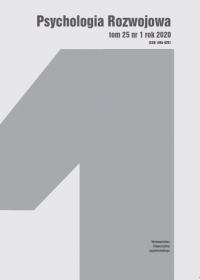Ekspozycja na fabularną prozę a spontaniczna versus jawna mentalizacja
Exposure to Narrative Fiction and Spontaneous versus Explicit Mentalization
Author(s): Adam Putko, Agnieszka Michałowska, Agata Złotogórska-SuwińskaSubject(s): Media studies, Fiction, Social psychology and group interaction, Cognitive Psychology, Personality Psychology
Published by: Wydawnictwo Uniwersytetu Jagiellońskiego
Keywords: theory of mind; reading fiction; imaginary simulation; exposure to television;
Summary/Abstract: The main objective of the study was to check for the existence of the effect of short-term exposure to fiction in the area of mentalization abilities (Kidd, Castano, 2013), taking into account the spontaneous versus explicit aspect of these abilities. An additional aim was to verify the hypothesis that at the root of this phenomenon lies the process of imaginary simulation. In the first part of the study, participants (N = 103, aged 18 to 25) were randomly assigned to one of four groups: (1) reading literary fiction, (2) listening to the same story as the first group, and at the same time imagining the events presented in it, (3) reading popular fiction, and (4) not reading any story. In the second part of the study, all participants completed mentalization tests, a test checking familiarity with fiction, and the questionnaire on practices of reading books, magazines and watching television. The study showed no significant differences between the groups in the results of mentalization tests, even under conditions conducive to imaginary simulation. Familiarity with fiction proved to be a positive predictor of spontaneous mentalization, and exposure to television was a negative predictor of explicit mentalization. The findings lead to the conclusion that short-term exposure to fi ction does not lead to a significant increase in spontaneous or explicit mentalization. However, both aspects of mentalization are connected with more long-term factors that are expressed in familiarity with fiction and exposure to television
Journal: Psychologia Rozwojowa
- Issue Year: 25/2020
- Issue No: 1
- Page Range: 49-67
- Page Count: 19
- Language: Polish

